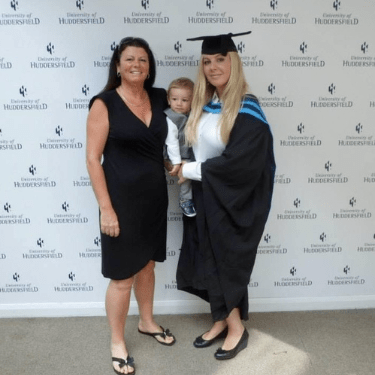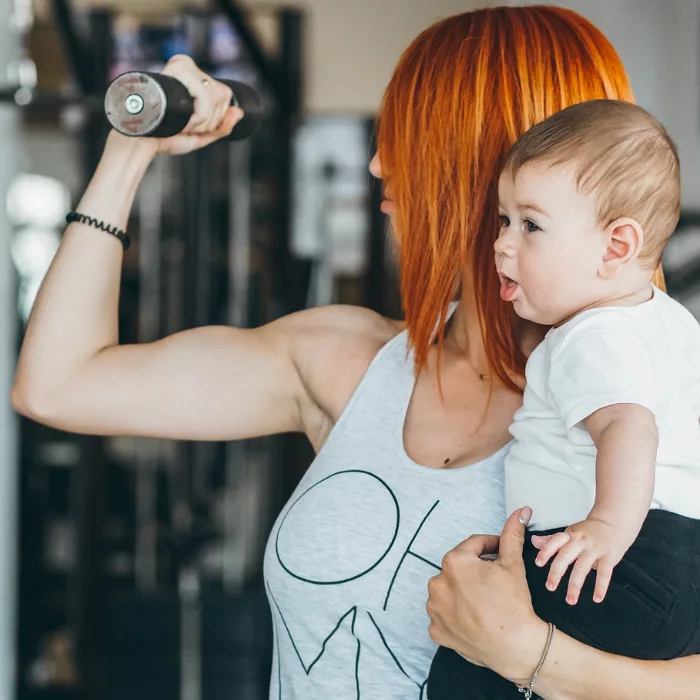
From Council Estate to Corporate Giant: Dr Julie Qualter’s Journey to Empowering Women in STEM
Dr. Julie Qualter’s life story is nothing short of extraordinary. Growing up on one of the toughest council estates in Greater Manchester, Julie faced a challenging start—one that included leaving school without qualifications, limited resources, and little hope of a promising future. But through resilience, determination, and a relentless pursuit of education, she transformed her life in ways she once thought impossible. Now a leader at Lonza, a global giant in pharmaceuticals and biotech, Dr. Qualter works in MODA Informatics, helping biopharma companies navigate digital transformations in manufacturing and quality control. Alongside her prestigious career, which includes earning a first-class Integrated Master’s degree and a PhD in clinical spectroscopy, she is a passionate advocate for women in STEM. Dr Qualter’s journey is a powerful testament to overcoming adversity and breaking barriers, and she is on a mission to inspire women to pursue their paths to greatness—no matter where they begin.
Growing up on one of Greater Manchester’s roughest council estates, what were some of the biggest challenges you faced, and how did they shape your early mindset?
Poverty shaped everything about my early life. Coming from a single-parent home, we struggled constantly despite my mum’s relentless work ethic. At twelve, I started my first job at a horse-riding school, working gruelling twelve-hour days on weekends for just £2.50. Later, I found myself packing Christmas selection boxes and dog treats in factories. Looking back, those early jobs built the foundation of my work ethic.
But it wasn’t just the poverty that marked life on the estate – it was the suffocating atmosphere of limited expectations. By five or six, I could identify heroin needles scattered on the streets. Violence, robberies, and drug deals were just part of daily life. What struck me most was how everyone seemed to accept this as their destiny. For boys, success meant becoming a drug dealer. For girls, the only path up seemed to be marrying rich. The idea of a woman building her own success story? That wasn’t even in the realm of possibility.
I couldn’t articulate what I wanted from life, but I knew with burning certainty what I didn’t want – to be trapped in that cycle of poverty and limited dreams. While I knew I wanted children someday, I was determined they would never experience the childhood I had. I had no roadmap for escape, but I knew in my bones that I would find a way out.
Leaving school with no qualifications is often seen as a significant setback. What inspired you to start over and pursue education again at 25?

The party scene swallowed me whole after leaving school. By thirteen, I was able to get into bars and clubs – it became my entire world. I drifted between Manchester and Ibiza, working in bars, living for the moment without a thought for tomorrow. I convinced myself I was successful just because I wasn’t on the estate anymore. Reality hit hard when I found myself living with my grandparents, broke and surrounded by dangerous people. The wake-up call came when I realized I was on a path to an early grave.
One morning, running purely on desperation and instinct, I walked into Tameside College. When they told me they were enrolling for nursing and midwifery, I looked the woman straight in the eye and said, “I want to be a nurse.” I knew nothing about nursing – it was just my lifeline out. During the course, a surprising thing happened – while I realized nursing wasn’t for me, I fell in love with biology. A chance conversation with someone who’d done a Women in Science course at Huddersfield University opened another door. When I got my university acceptance letter – which I still keep as a talisman – I couldn’t believe it. From there, I climbed from a forensic degree to a PhD. The irony still makes me smile – from failing my math GCSE to studying quantum physics.
Your journey has included several personal challenges, including being a single parent, dealing with loss, and facing financial hardship. What strategies or mindsets helped you overcome these obstacles and keep pushing forward?
Survival meant keeping moving forward. Yes, there were countless nights spent crying on the kitchen floor, but I always got up, wiped my face, and asked myself, “Right, how are we going to fix this?” Being alone in those moments probably made me stronger – there was no choice but to be.
My son Rocco became my reason for everything. Single parenthood for seven years brought its challenges, but also unexpected joys. When he wasn’t with his dad, I made every moment count. We might not have had money, but we had adventures – long walks in the park, and explorations in nature. Watching him find joy in these simple moments helped me forget about being broke; it taught me true gratitude.
The hardest part was losing my younger brother to drug addiction. He never broke free from the estate’s gravitational pull, and it ultimately took his life. The survivor’s guilt weighs heavy – why did I find a way out while he remained trapped? Too many from my old estate have met similar fates – overdoses, suicides, prison sentences, and children taken into care. In working-class areas, these tragedies become normalized through their sheer frequency. The hardest part is watching people accept this as their lot in life, never fighting for something better.
You spent 12 years studying as a mature student, ultimately earning a PhD in clinical spectroscopy. What were some of the toughest moments during this period, and what kept you motivated?
When I told people I was studying science, the laughter was immediate and cutting. “You’re living in a dream world,” they’d say, waiting for me to fail. But their doubt became my fuel – every dismissive comment pushed me harder. Even my own family didn’t believe in me, which made earning my PhD all the sweeter. Some celebrated my success, while others accused me of becoming stuck-up, no longer the “agreeable dumb blonde who liked to party” they once knew.
Those twelve years transformed me completely, especially after becoming a mother. I remember when Rocco was three months old, I returned to university full-time. Each morning after leaving him at nursery, I’d break down in tears. Finally, I gave myself an ultimatum: either quit university and be a full-time mum, or commit fully to both roles and make them work. I chose both, channelling everything I had into my studies while making our time together count.
Imposter syndrome is something many high-achieving people experience. How did you handle moments of self-doubt throughout your academic and professional journey?
Throughout university, I felt like an outsider looking in. Other students talked about their parents’ emotional and financial support, celebrating good grades with family meals and gifts. Meanwhile, I was working alongside my studies, pushing twice as hard just to keep up. I never talked about my background, terrified of judgment. Every day felt like living a life that wasn’t meant for me, but my desperation to better myself kept me going.
The imposter syndrome peaked after my PhD. In 2017, despite my qualifications, I found myself back in a council flat, surviving on benefits despite a full-time job. We sat on camping chairs because I couldn’t afford furniture. At night, the parties and drug use outside my son’s window felt like a cruel reminder of where I’d started. Here I was, thinking education would be my escape, yet I’d landed right back where I began.
Then came the biotech job, and my life transformed overnight – but the fear remained. I’d be in meetings with the Ministry of Defence, discussing complex projects while sitting in my council flat, cannabis smoke drifting through the windows. I lived in constant terror that they’d discover my background and realize I was a fraud. But no one did, and I kept pushing forward. Eventually, I saved enough to move and buy my first home, though the feeling of being on borrowed time lingered.
The turning point came when I realized I needed to surround myself with different people – positive, ambitious individuals who lifted me. I made the difficult choice to distance myself from anyone holding me back. The transformation was remarkable – your environment does shape your reality.
As someone who started with few resources, you’ve achieved a remarkable career in STEM. What advice would you give to other women facing similar beginnings who want to enter and succeed in this field?
When women tell me they’re not smart enough for science, I want to shake them awake. Intelligence isn’t some magical gift you’re born with – it’s the ability to learn, to absorb and apply knowledge. Nobody understands everything immediately; that’s not how learning works. When I started university, every lecture left me confused. But I’d go home, and rewrite my notes again and again until my fingers blistered and finally, the knowledge stuck.
Your background doesn’t define your potential. It doesn’t matter if you grew up poor, struggled in school, or juggled single parenthood. What matters is your determination to change your life and your willingness to put in the work. Science isn’t reserved for the naturally brilliant – it’s for the brilliantly determined.
Now working in MODA informatics with Lonza, you’re part of a company focused on helping patients through therapeutic innovations. How does this mission resonate with your own goals and values?
Working at Lonza feels like more than just a job – it’s a profound privilege that still humbles me every day. To think that my work directly contributes to enhancing or even saving lives… it’s the kind of purpose I never imagined possible growing up on that council estate. I believe deeply that every human being deserves the chance at a long, healthy life, even though we know that’s not always the reality.
These therapeutics we work on aren’t just medicines – they’re lifelines, offering people the chance at a normal, extended life. When I stop and think about it, it takes my breath away. Here I am, collaborating with some of the most innovative minds on the planet, and together we’re helping to save lives. Coming from where I started, to now being part of something this meaningful… I truly feel blessed. It’s more than success – it’s significance.
You mentioned receiving unexpected recognition after a recent live event. How has your role as an advocate for women in STEM evolved, and what does this recognition mean to you?
When the video was shared with colleagues, the response was overwhelming in the best possible way. Having women senior leaders and VPs reach out personally to support my mission for advancing women in leadership – validated everything I’ve been fighting for. The fact that my journey resonated with so many people showed me that these experiences, these struggles, aren’t just mine alone.
Being recognized and rewarded for investing in my personal and professional development has been transformative. It’s not just about the acknowledgement – it’s about the platform it’s given me to create real change. This recognition has ignited something in me – a confidence and inspiration to push further, to do more. I’m energized by the possibilities of how I can use this platform to drive meaningful change in STEM businesses.
The response has shown me that there’s a real hunger for change, for more diverse voices in leadership. And now, I’m not just dreaming about making that change – I’m positioned to actively help create it. The excitement I feel about this next chapter, about the potential to reshape what leadership looks like in STEM… it’s indescribable.
With your mission to inspire and empower other women in STEM, what do you believe are the most important qualities or skills for women aspiring to leadership roles in this field?
Finding your voice – and having the courage to use it – that’s critical. It’s all too easy to become invisible when you’re sitting in a room full of confident, articulate men who seem to have all the answers. I’ve been there, shrinking myself to fit into spaces that weren’t designed for women like me. But here’s what I’ve learned: challenging the status quo isn’t just about being brave – it’s about driving innovation forward.
Yes, it’s intimidating to challenge someone’s views, especially when they have decades more experience than you. But your perspective matters. Your experiences matter. That fresh pair of eyes looking at an old problem might just be exactly what’s needed. Innovation doesn’t happen in an echo chamber – it comes from the collision of different viewpoints, from challenging accepted wisdom, from daring to think differently.
Looking back on your incredible journey, what is the single most important lesson you’ve learned about resilience, and how do you hope to pass this on to others?

People often talk about resilience like it’s a personality trait – something you either have or you don’t. But that’s not how it works. Resilience is built through trauma, through falling and getting back up, time and time again. It’s a muscle you develop by using it, often because you have no other choice.
Does life get easier the more resilient you become? No – and that’s a crucial truth we need to acknowledge. What changes is your capacity to handle life’s challenges? You develop better coping mechanisms, a clearer perspective, and stronger recovery skills. You learn to recognize that bad moments, however intense, are just that – moments. They’re not your whole story.
Bad things will happen – that’s not pessimism, it’s just life. But here’s what I want people to understand: the bad times don’t define you, and they don’t last forever. The key is learning to ride the waves – to embrace the good times fully when they’re here, and to hold onto hope when you’re in the depths. Better days aren’t just a possibility – they’re an inevitability if you keep moving forward.
APPLY TODAY
100 Top Global Women Entrepreneurs – Global Woman Magazine
Our Journey in 12 Months:
Our Journey in 12 Months – Global Woman Magazine
5 Things That Show Money is Not Evil:
5 Things to Show That Money Is Not Evil – Global Woman Magazine
Global Man Magazine Page:
Global Woman, Global Man: Socials:
Global Woman Magazine (@global_woman.magazine) • Instagram photos and videos






